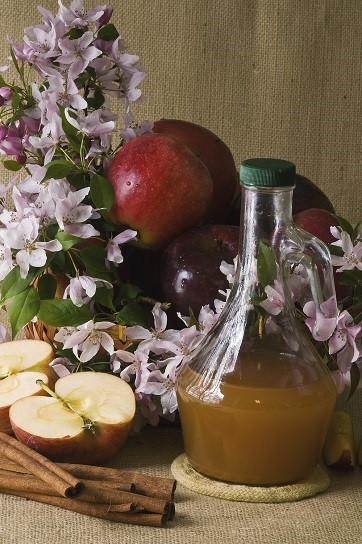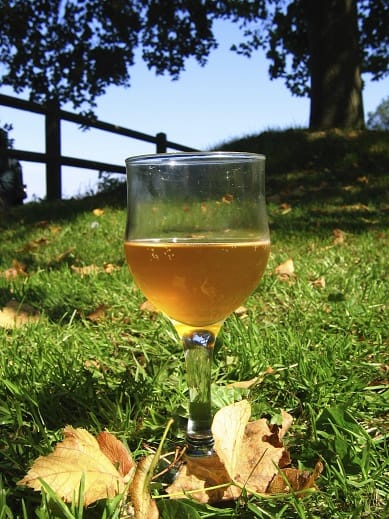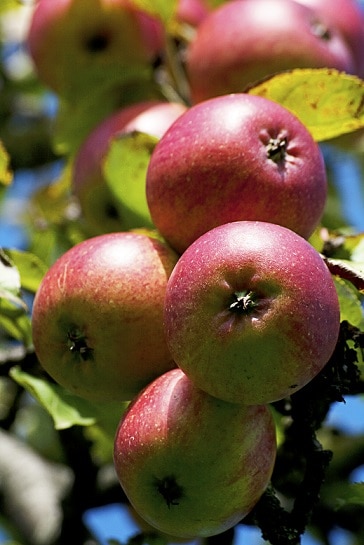 With the current popularity of folklore remedies, one old foodstuff has been catapulted to elite status – apple cider vinegar.
With the current popularity of folklore remedies, one old foodstuff has been catapulted to elite status – apple cider vinegar.
It all started around 5000 years ago, with the earliest recorded usage by Ancient Egyptian and the Babylonians. By 400BC Ancient Greece, the father of modern medicine Hippocrates (or maybe grandfather by now) prescribed apple cider vinegar mixed with honey or colds and coughs. The vinegar has antiseptic properties, and surfaces throughout history as a disinfectant for soldiers’ war wounds, to speed up their return to battle, particularly during the American civil war, and as late as World War 1.
As for the modern popularity, enthusiasts claim that apple cider vinegar treats diabetes to acid reflux, cancer to arthritis, athlete’s foot, warts, halitosis, urinary tract infections, gout, nettle stings, and much more.
Many douse their hair in it to kill off head lice. It’s so popular that it’s even available in pill form if you can’t stand the acidic taste.
Not surprisingly, apple cider vinegar has been circulating the internet as a miracle cure for acne as well. Hence, we will now discuss…
- Whether eating apple cider vinegar can clear acne.
- Whether applying apple cider vinegar topically can clear acne.
Let’s get started:
Is apple cider vinegar packed with nourishing nutrients?
 Apple cider vinegar is basically a fermented apple seasoning. Firstly, crushed apples are exposed to strains of yeast, which ferment the sugars and manufacture alcohol as a by-product. You now have the alcoholic beverage apple cider. Secondly, more bacteria is added, which devours that alcohol and creates a new by-product called acetic acid, which is the main active component of vinegars.
Apple cider vinegar is basically a fermented apple seasoning. Firstly, crushed apples are exposed to strains of yeast, which ferment the sugars and manufacture alcohol as a by-product. You now have the alcoholic beverage apple cider. Secondly, more bacteria is added, which devours that alcohol and creates a new by-product called acetic acid, which is the main active component of vinegars.
The origin story is also fascinating. Thousands of years ago, somebody stored a keg of grape wine for far too long, and when they returned to drink it, they instead discovered a sour, non-alcoholic liquid. Hence, the name “vinegar” originates from the French words for “sour wine.”
Unfortunately, the bacteria is also the problem; it consumes many of the whole apple’s nutrients. One of the classic claims is that apple cider vinegar is a bona fide nutritional powerhouse. One tablespoon is supposedly bursting with minerals, vitamins, complex carbohydrates, amino acids and healthy fibres like apple pectin.
Upon only basic analysis, that’s clearly not the case. Apple cider vinegar is not “rich in bone strengthening calcium”; it barely contains 1mg, just 0.1% of the 1000mg RDI.
Read Annihilate Your Acne – get the greatest diet ever for clear and radiant skin
Vital acne nutrients are especially scarce. It contains no vitamin C, no vitamin A, no vitamin E, and hardly any potassium despite that being a main touted benefit. The acne minerals like zinc and magnesium are similarly feeble.
Insulin control – the greatest power
So is apple cider vinegar just an acidic seasoning with a bonus power of scrubbing floors and cleaning windows?
Absolutely not, because apple cider vinegar has an unproven but extremely promising link to insulin reduction.
One 2004 study from the American Diabetes Associates gathered 29 people with either type 2 diabetes (10 people), prediabetes (11) or healthy insulin and glucose (8). They each took either nothing or vinegar with a carbohydrate-rich meal, containing a bagel and orange juice (no 15 inch pizza sadly).
The result: vinegar boosted insulin sensitivity during the post-prandial (post meal) insulin and glucose spike. It was most significant for prediabetic people, with a 39% increase. But even diabetics had 19% higher insulin sensitivity – nobody was left out. The bloodstream glucose and insulin spike was also lower in everyone, and particularly prediabetics (again).
Essentially, stronger insulin sensitivity allows less insulin to do the same job, helping blood levels to fall.
That’s excellent news for acne, because insulin is the worst hormone behind clogged pores. It stimulates your sebaceous glands to pump out floods of oil.
Blood sugar isn’t immune either. A 2007 study on 11 type 2 diabetics found that taking just two tablespoons of apple cider vinegar before bed lowered morning glucose levels by between 4 and 6 percent. According to scientists, ACV deactivates some of the digestive enzymes which break down carbohydrates and sugar, thus mellowing the blood glucose increase.
Apple cider vinegar seems to be great at lowering blood glucose in all circumstances, but particularly if your levels are elevated. High blood glucose causes acne by increasing free radicals called AGEs, increasing sebum again, and cranking up dead skin cell turnover, clogging your pores. Carb and sugar rich diets are a classic cause; so is eating very few fruits and vegetables, and leading an inactive lifestyle.
It may improve your gut health
But how does apple cider vinegar achieve these improvements with almost no micronutrients?
The answer may lie in the abundant acetic acid created during fermentation. Acetic acid may be what slows down the digestion of complex carbohydrates. Better, it might have other digestive benefits.
Because it’s an acid, acetic acid is believed (though not proven) to enhance mineral absorption, including important ones for acne like zinc and magnesium. That would make ACV perfect for seasoning some acne-friendly meat or salad, for example. People with low stomach acid would particularly benefit, as the acetic acid could replace hydrochloric acid and break down foods more efficiently.
Acetic acid also kill harmful bacteria like E.coli, by binding to the cell membrane and completely destroying its structure. E.coli can trigger leaky gut syndrome if it overgrows, an overlooked inflammatory disease behind acne. ACV also contains malic acid, another enemy of unhealthy gut bacteria.
Next: the 6 vitamins and minerals which can massively reduce acne
Furthermore, apple cider vinegar, and indeed all vinegar in its undiluted form, contains a slimy gelatinous material called the “mother”.
This is produced via acetic acid fermentation. According to theories, the slime is packed with friendly acetobacteria, and can replenish your gut’s friendly stocks. However, there’s no evidence that acetobacteria actually colonises your gut like the fantastically healthy yoghurt or sauerkraut. The “mother” does contain plenty of lactic acid bacteria, and ACV is undoutedly bacteria rich; it multiplies exponentially as it ferments the nutrients.
Unlike with insulin resistance though, there’s little solid evidence connecting apple cider vinegar to healthier gut flora.
In fact, the confirmed antibacterial powers of acetic acid (against e.coli) could even backfire against healthy strains. Apple cider is recommended for prebiotics such as apple pectin, which should fuel your healthy gut bacteria, but the vinegar contains none. The bacteria devours it all during fermentation. If you want prebiotics then a whole apple is superior, both for intact apple pectin and subtler prebiotic fibers.
Apple cider vinegar is also high in the antioxidant quercetin. This is one of the best phytonutrients in apples themselves; quercetin specialises in calming the immune system mast cells in your gut, which creates histamine and therefore the random food allergies which commonly cause acne. Quercetin also strengthens your gut lining against inflammatory molecules.
Therefore, apple cider vinegar gains some promise, but there’s also evidence that its strong acidity inflames the gut. Acetic acid is often used in studies to deliberately inflame the gut, in order to test an anti-inflammatory medicine.
Conclusion: the jury is out on apple cider vinegar’s gut healing properties.
Does ACV aid detoxification?
Here’s a quote from an alternative medicine website: “Aside from all the other body cleansing benefits already listed, drinking diluted raw and unfiltered apple cider vinegar is believed to help detoxify and cleanse your liver”.
This is one benefit you should never fall for. Apple cider vinegar does not improve your detoxification; don’t believe a word of it. How is apple cider vinegar supposed to aid the liver? Nobody ever explains how. There’s no evidence for this whatsoever.
Removing toxins isn’t as important for acne as you may have heard anyway. You need a healthy detoxification system to prevent glutathione from being depleted, which functions both as a detoxifying agent and an antioxidant…
…but it’s a myth that toxins are forced out through your skin pores, mix with p.acnes bacteria and cause acne, and it’s a myth that apple cider vinegar can correct that.
Is apple cider vinegar an acne super cure?
There’s no evidence whatsoever that apple cider vinegar can miraculously heal all sorts of maladies. It doesn’t cure cancer or arthritis, and it probably won’t cure acne either. ACV’s best researched benefit is undoubtedly lowering blood sugar and insulin levels.
Therefore, it’s a decent seasoning for a salad dressing, or in homemade sauces and marinades. Adding apple cider vinegar to baked goods will provide extra lift. It also tastes good with fish, and can tenderize meat while giving it an apple flavoured tang.
For other acne root causes though, it’s hardly useful at all. If digestive issues are to blame, then yoghurt or sauerkraut are much better for bacteria. A whole apple, or indeed any fruit or vegetable, will contain more prebiotics such as fiber and obscure plant compounds.
A whole apple will also contain far more acne-clearing antioxidants and vitamin C.
The fundamental truth is that apple cider vinegar is no miracle cure. It’s just another moderately acne-friendly food to add to your diet. We’ve analysed many on this website, whether it be sweet potatoes, chocolate, strawberries or broccoli, but not one is a silver bullet against acne.
Instead, your priority is arranging a diet with a wide variety of acne nutrition flooding in.
Apple cider vinegar also has some dodgy side effects, particularly due to acetic acid. Some women have reported long term damage to the throat, and oesophageal burns. Drinking undiluted ACV straight from the bottle can degrade your tooth enamel over many years, giving rise to cavities. A serious ACV addiction could even lower bone density and potassium levels.
The 7 greatest topical treatments for naturally clear skin
Therefore, to lower insulin and blood glucose, you should only use moderate quantities. Always dilute ACV with water; it tastes pretty vile anyway if you don’t. Personally, if you’re looking for some extra acne-friendly flavour, I’d easily recommend extra virgin olive oil first. It’s loaded with acne-clearing antioxidants, including one called oleuropein with extreme anti-inflammatory properties.
Apple cider vinegar as an acne topical treatment
 As for rubbing apple cider vinegar onto your acne directly, it’s a similar story. It does get some pretty stellar user reviews:
As for rubbing apple cider vinegar onto your acne directly, it’s a similar story. It does get some pretty stellar user reviews:
- “I got clear within a week, my pores shrank, and my overactive oil glands shrank too.”
- “My skin looks so much better, I can’t believe it. My skin has a healthy pink glow!”
- “I tried it last night and my 8-9 pimples are already gone”.
- “I was amazed at how well apple cider vinegar worked on my acne”.
Likewise, the theories make decent sense. Despite the alternative medicine community preaching about the horrors of all things acidic, human skin actually thrives in acidity. Many skin-ruining species of bacteria, possible including the dreaded p.acnes itself, thrive when your PH gets out of whack. ACV could easily fix any PH problems you have.
Likewise, the acid has decent keratolytic properties: it breaks open the bonds between dead skin cells and unblock your pores. The healthy bacterial strains could even inundate your pores, give p.acnes a pummelling, and improve the wider bacterial flora of your skin.
Apple cider vinegar undoubtedly works wonders for some when applied to acne. In fact, there’s a subsection of the acne community that defends ACV passionately…
…but again, you could also experience side effects. Some stories include:
- An acne patient with high hopes for ACV, who developed a huge patch of raw, burnt skin.
- A mother who applied cotton balls soaked in ACV to her eight year old child’s leg to control a viral infection, only to give him painful burns.
- One guy with acne who tried it during summer and “bleached the heck out of his skin”. Apparently, his skin went deathly pale while everyone else was walking around with a tan.
Again, acetic acid is very strong stuff. It can work well for unclogging pores in the short term, but what I cannot recommend is leaving apple cider vinegar on your face overnight like many recommend. 7-9 hours of exposure is destined to cause facial irritation. You could easily make your acne look worse, not better.
Green tea – proven to reduce acne by up to 51% after 8 weeks
The stories above were all long term too. Therefore, if you’re determined to try ACV, I’d recommend no more than 30 minutes of exposure, since you can easily unclog your pores and kill p.acnes bacteria in that time anyway. Furthermore, apple cider vinegar smells nasty, and you too will smell nasty if you leave it on your face for hours.
Again, you should always dilute the apple cider vinegar in water. Some suggest a ratio of AVC to water of 1:1 to 2:1. It’s also hyped up as a general toner and enhancer, but there’s no evidence of that whatsoever. It definitely won’t moisturise your skin like grapeseed oil. If ACV does work, it will be best for areas of especially infected and rampant acne.
Conclusion
Apple cider vinegar is one of the most overrated acne cures ever.
It has two decent acne powers: lowering insulin and blood glucose when eaten, and unclogging skin pores when applied.
Maybe you’ve had excellent results with ACV; many acne patients have. However, there’s simply far too many superior (and easier) acne strategies.
You can add oregano, the fifth best source of antioxidants ever, to your meat. You can eat sweet potatoes instead of bread, you can try grapeseed oil with its vitamin E, or tea tree oil, which is proven to clear acne thanks to its terpinen 4-ol compound.
My top recommendations apiece for diet and topical treatments would be this. Number one, you should ruthlessly slash your sugar intake to below 50 grams a day. Number two, I’d advise you to apply raw honey to your individual red and angry pimples, since almost all products derived from the bee kingdom (see royal jelly also) are bacteria-destroying juggernauts.
At best, apple cider vinegar is a relatively healthy seasoning for salads or meat. Overall, ACV is mostly pointless for acne unless you’re a real nut for experimentation.
NEXT: the ultimate diet for clearing acne permanently
Thanks for reading!

thank you for informative post. Was thinking of writing a post on pros and cons of ACV, i found out the one i was looking for.Keep up the work
Dr. Mercola is such a big fan of apple cider vinegar. It is remarkable, Richard.
It is pretty remarkable as a household cleaner, to replace normal versions with toxic chemicals, but for skincare it’s very overrated.
Is good for weight loss/as a fat burner as so many people suggest?